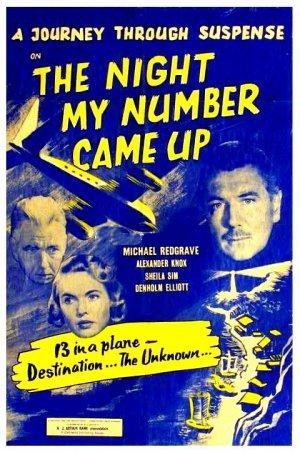
THE NIGHT MY NUMBER CAME UP
UK, 1955, 94 minutes, Black and white.
Michael Redgrave, Sheila Sim, Alexander Knox, Ursula Jeans, Denholm Elliot, Ralph Truman, Michael Hordern, Alfie Bass, Bill Kerr.
Directed by Leslie Norman.
A very well made and entertaining British thriller from the early fifties with the crisp British style. Michael Redgrave and Alexander Knox give authority to the central roles. Leslie Norman, the director of many war films like Dunkirk and The Long and the Short and the Tall, as well as such films as The Summer of the Seventeenth Doll, makes a very efficient thriller about premonitions of disaster for aircraft and dreams and reality. A short, quality film of Britain in the fifties.
1. How enjoyable a thriller was this? Suspense film, disaster film?
2. The significance of the title, its emphasis on fate, its meaning in this film, questions of destiny? How appropriate a title?
3. The effectiveness of the structures the nature of the dream, the happening and the accident, the fulfilling of details of the flight, the suspense of the crash and the fulfilment of the dream? How did this involve audience interest and participation?
4. What insight into the nature of dreams and reality did the film offer? Dreams and omens? Superstition? Foreknowledge? This kind of dream as a basis for action and decision? Responsibility on the basis of such dreams?
5. How well did the film define and present characters? In relationship to the dream and the flight? The emphasis in the characterization on fear, the fear of fear, reactions to crisis situations?
6. Hardy, his role as the commander, with responsibility and decision, his awareness of the dream and its implications, the sequence of his guiding the pilot? What effect did the situation have on him, how did he cope?
7. Robertson as the focus of fear and anticipation? As a defined character, audience interest and sympathy, identifying with his fears, his fear of fear, his telling other people of the dream, especially the pilot? Should he have delayed going on the flight or should he have gone on fatalistically? The importance of his discovering that he was not the fearful a man? His insight into his own character in coping with the crisis?
8. Mackenzie, the background of his working for Hardy, his ambitions, his relationship with Mary, the reaction with the storm and the voyage? How much did he believe in the dream?
9. Mary: feminine interest and contrast, the effect on her?
10. Bennett and the fulfilment of the dream? The nature of his brashness, manoeuvring his way on to the plane, people trying to oppose his going on the plane, Robertson's fears, Hardy's decision? The fact that he was the one to go into crisis?
11. Wainwright as the important person on the plane, and his management of the situation?
12. Audience identification with the pilot in the crisis? The fact that he knew the details? The fatalistic possibility of letting go and crashing? The intervention of Hardy? The pilot's manoeuvre to save the plane?
13. The importance of the soldiers, as detail of the dream, their human reaction about being put off?
14. The importance of the characterization of Lindsay for the film? Initially meeting him explaining where the search should be held, his reminiscence about the party, the credibility of his dream? His returning when all was justified at the end?
15. The film's attention to detail of character, the flight, the details of the dream being fulfilled, the nature of the flight over Nagasaki and Hiroshima, the cloud, the coastline, going In circles, the visual repetition of the dream sequence?
16. How do audiences identify with this kind of film? Fears, disaster, superstition? Closeness to experience?